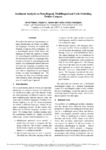Sentiment Analysis on Monolingual, Multilingual and Code-Switching Twitter Corpora

Use this link to cite
http://hdl.handle.net/2183/34995
Except where otherwise noted, this item's license is described as Atribución-NoComercial-CompartirIgual 3.0 Internacional
Collections
- Investigación (FFIL) [877]
Metadata
Show full item recordTitle
Sentiment Analysis on Monolingual, Multilingual and Code-Switching Twitter CorporaDate
2015Citation
David Vilares, Miguel A. Alonso, and Carlos Gómez-Rodríguez. 2015. Sentiment Analysis on Monolingual, Multilingual and Code-Switching Twitter Corpora. In Proceedings of the 6th Workshop on Computational Approaches to Subjectivity, Sentiment and Social Media Analysis, pages 2–8, Lisboa, Portugal. Association for Computational Linguistics.
Abstract
[Abstract]: We address the problem of performing po-
larity classification on Twitter over differ-
ent languages, focusing on English and
Spanish, comparing three techniques: (1)
a monolingual model which knows the
language in which the opinion is written,
(2) a monolingual model that acts based on
the decision provided by a language iden-
tification tool and (3) a multilingual model
trained on a multilingual dataset that does
not need any language recognition step.
Results show that multilingual models are
even able to outperform the monolingual
models on some monolingual sets. We
introduce the first code-switching corpus
with sentiment labels, showing the robust-
ness of a multilingual approach.
Keywords
Sentiment analysis
Twitter
Natural language processing
Natural language processing
Editor version
Rights
Atribución-NoComercial-CompartirIgual 3.0 Internacional






